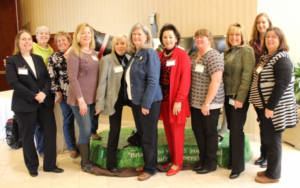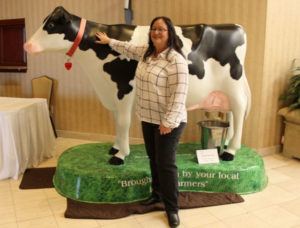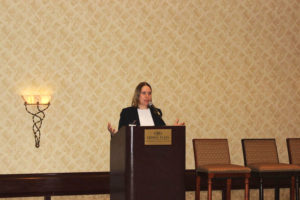
The 2018 conference brought together 180 farmers and partners focused on expanding the success of women in sustainable agriculture.
By: Leila Naylor, Rhode Island FSA Administrative Specialist
Started a few years ago, the Rhode Island Women in Agriculture conference was a great way to bring together women farmers from across the state to talk tips and tricks of the business. This year’s conference – organized by the new nonprofit Rhode Island Women in Agriculture – brought together 180 farmers.
“This biennial event has grown significantly over the years and provided many women farmers with the resources they need to succeed in agriculture,” said Ingrid Fratantuono, Rhode Island USDA Farm Service Agency (FSA) farm program specialist.
The number of women farmers in New England is growing, and in recent years, women-owned farms have accounted for 25 percent of the total farms in Rhode Island.
To help meet the need of women farmers, USDA got together with the University of Rhode Island, Rhode Island Department of Environmental Management and non-profit agricultural organizations, to hold the first Rhode Island Women in Agriculture conference in 2011. Since then, it’s grown into a regular event.

Nancy Becker, Farm Service Agency program technician, stands with Daphne the Holstein at the conference.
“Rhode Island has built a strong agriculture community, dedicated to helping one another succeed. That’s what this event is all about,” Fratantuono said.
At the 2018 conference, participants were able to share educational and organizational strategies and forge new connections, all aimed to expand the success of women in sustainable agriculture. Conference topics included biosecurity, agritourism, entrepreneurial women in farming, beer, wine, and bourbon, honeybees, the Food Safety Modernization Act and more. Each attendee left the conference with new connections and an informational resource guide.
FSA has had a presence at each conference, sharing information about the various programs and services available to assist producers. For example, USDA’s Microloans offer more flexible access to credit for small, beginning and niche agricultural operations.

As the special guest speaker, Katina Hanson spoke to attendees about farm programs and loans available through FSA.
Katina Hanson, acting director of the FSA Office of External Affairs, spoke to attendees about farm programs and loans available through FSA. Additionally, Hanson discussed her efforts with the USDA National Women in Agriculture, which helps women connect with other women in agriculture across the country.
“Many women continually face the challenge of balancing work life and family life,” said Fratantuono. “Providing women in agriculture with readily available tools and resources is essential to their overall success.”





